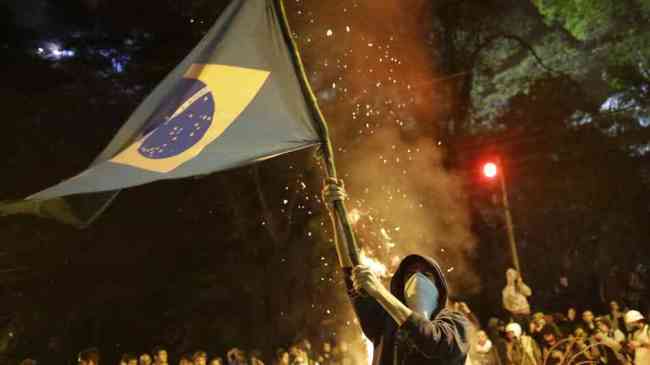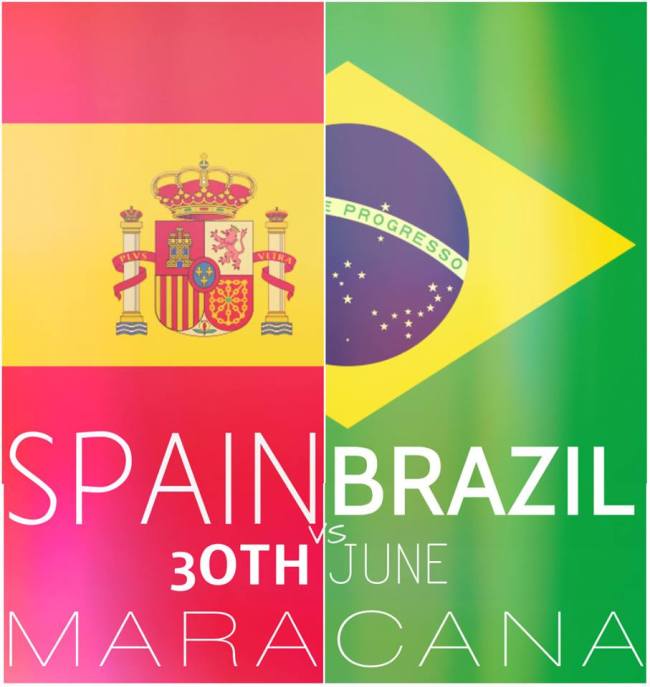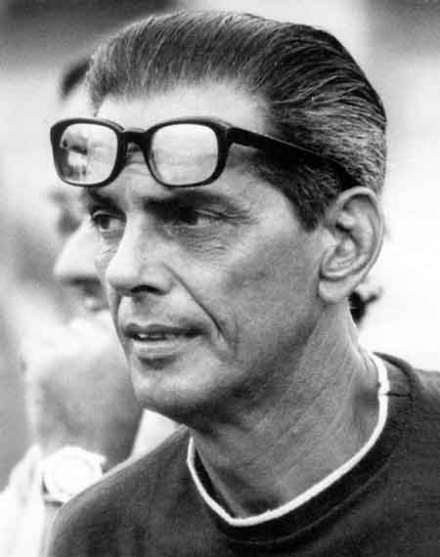Lost Sambista
A Brazil never seen.
Archive for the tag “world cup”
What are the protests in Brazil about?
While Brazil’s economic well being looks promising in the short and in the medium run, things have been strange in the political arena. Earlier this year, during the Confederations football Cup, there was a raging wave of protests while, under the surface, there is political unrest that may erupt during the World Cup.
Any uninformed person would jump to the conclusion that the protests come from the hungry masses who are discontent with the government for privileging big contracts instead of spending money on hospitals, education, housing etc… It is true that many are not happy but no, this is not where the anger is coming from. The discontent is coming from the middle and upper middle classes. The typical protester is a young, white male with a good level of education and no economic upheaval to deal with.
In other words, the protests are coming from the right rather than from the left. In general, the vast majority of the Brazilians, the working class, do not have strong reasons to protest, a proof of this is that there are very few working class people in the protests. The statistics show that there has been an improvement in their standards of living; more jobs, more education, more consumption… the list is long. They have benefited from the policies of the current left wing party, the PT, that has been in power for around a decade and that will most probably win the next elections.
So what are the protests about? Ask the average middle class Brazilian, and he will answer that they are about corruption in the government, more specifically among members of the PT. This is where the argumentation gets bizarre, they do not mention corruption in other parties, which in many cases is more severe than in the PT and if you listen closely, they will describe corruption as an exclusivity of the Lula and the Dilma governments, a clear fallacy for anyone who knows anything about Brazil.
There will also be the technocrats who will say that they are annoyed at the enormous presence of the State in the economy. They will defend Brazil adopting an economic model closer to the precepts of Wall Street and of the City of London: leave everything to private enterprise; they have the most qualified people and they know what they are doing. However, this is not what the protest are about, the young people in the streets do not carry neo-conservative nor monetarists flags. These arguments are only being heard now when the economy is beginning to dip. It was not so when Brazil paid their gigantic external debt, fixed the hyperinflation that corroded Brazil in the 80’s and in the 90’s and when it became the darling of international investors. In fact, the last time anyone heard these voices was when they gave terrible advice to the military regime in tackling the economic crisis. Everyone knows that if it were for these people Brazil would never have climbed out of that hole.
The question still begs an answer, what are the protests about? It is our understanding that they are about anxiety and powerlessness in the middle classes. The moralistic crusade, the hatred towards the left, the privileging of the technical over the democratic process reverts us to the rise of fascism and Nazism in the 1930’s. The country that the PT constructed during its large mandate has helped the rich to get richer and has taken a huge portion of Brazilians out of poverty. Meanwhile, the PT’s traditional voting base, the urban middle class, has not received the benefits of the economic growth. In many ways, they feel betrayed and are now worried about what will happen after the World Cup and the Olympic Games.
Justified or not, the poison is in the air. The protests were violent and there may be an escalation during the World Cup, when the embarrassment for the Government and the international exposure will be at its greatest. There are many questions: No one knows what this new right wants, not even themselves. All we know is that there is a lot of irrational anger and that they want the PT out. Apart from this, there is no party behind them nor do they have any leadership or any defined goal. Never the less problems may arise when some better organized group or power will appropriate this energy and use it for nonconstructive purposes.
Brazil vs Spain: a football showdown.
Tomorrow’s game is an important showdown for many football lovers. For some if Spain beats Brazil in the epicenter of Brazilian football passion, the Maracana, it be like the passing of the crown of world football dominance from Brazil to Spain. For others, if Brazil wins the match it will signify the coming of age of the Neymar generation where they will stop being a promise for the future and will become part of the Brazilian pantheon of football legends.
For the coach Felipao, or Big Phill, who has been in charge of this Brazil team for a little more than a month this will not be the ultimate test. He is a pragmatic man who is still building the team, his aim is winning the World Cup next year, not the Confederations Cup. When he won the World Cup in 2002 with Ronaldo, Ronaldinho, Roberto Carlos, Rivaldo et Cie, his team had been appalling in the qualifying stages and he attracted a lot of enmity by not calling up Romario, the country’s top scorer at the time.
For the Spaniards the game will mean a lot, it is the jewel that is missing in this amazing team’s crown, They have won the European Cup, the World Cup but not the Confederations one, and more importantly they have never beaten Brazil especially, and doing this in a world class final in the Maracana will be something that they hunger for. They want to brush off the questions regarding Brazil’s football superiority,
Despite Big Phill’s pragmatism, the Brazilians will also want to win, loosing a final in Brazil’s major football temple in front of a gigantic crowd would be a disgrace they would not want to live with, neither the players nor the coach. With players who are still seeking international consecration there is the added stimulus of ranking upgrade.
As for the game, Brazil and Spain have shown themselves similar in one aspect, they have “on” and “off” modes. When they are “off” they are vulnerable, nervous and make mistakes like any other team but when they are “on” they are unstoppable. The Spanish team has been playing together for longer and technically they are superior: more disciplined, more uniform in their talent and more seasoned in big competitions. But they have the disadvantage of coming from an exhausting game against Italy and many of the players will have the fear of facing the Brazilian yellow top in a competition.
As for our predictions; we think that Brazil’s “on” mode is wilder, less predictable and more creative which allied with the unique atmosphere of the Maracana will give Brazil the advantage. Brazil will win.
Lost Samba, a first person history of the birth of modern Brazil
 As London passes the Olympic flame to Rio de Janeiro, English-Brazilian author Richard Klein launches ‘Lost Samba’, an account of Rio’s bitter-sweet ‘golden days’ in the sixties and the subsequent roller-coaster ride from the military sponsored Brazilian “Economic Miracle” to the depths of the 1980s Brazilian economic catastrophe, all seen through the eyes of the author, a European who grew up as a citizen of Brazil’s legendary Copacabana and Ipanema.
As London passes the Olympic flame to Rio de Janeiro, English-Brazilian author Richard Klein launches ‘Lost Samba’, an account of Rio’s bitter-sweet ‘golden days’ in the sixties and the subsequent roller-coaster ride from the military sponsored Brazilian “Economic Miracle” to the depths of the 1980s Brazilian economic catastrophe, all seen through the eyes of the author, a European who grew up as a citizen of Brazil’s legendary Copacabana and Ipanema.
Klein was born to an ex-pat British mother and a holocaust-survivor father in the iconic year (1962) which also gave birth to the Beatles as a recording band, the ‘Girl from Ipanema’ and Brazil’s second World Cup victory. His book describes the Brazilian 1970 World Cup triumph, seen through the eyes of an eight year old boy living in Rio, in the era of Pele, and the subsequent football fever that engulfed the country. As a musician, Klein also gives a personal insight into the evolution of Brazilian music from the Bossa Nova of the sixties to the rock scene in the eighties.
The author says: “With the world’s eyes turning once more to Brazil – hosting the soccer World Cup in 2014 and the Olympics in 2016 – Lost Samba peers through the clichés to give a true, first person guide to the country’s recent history and its colourful and vibrant lifestyle.
“Lost Samba describes my personal contact with a wide range of Rio de Janeiro society, from the elite in the American School to Favela drug dealers. It takes the reader on an eventful hitch-hiking journey in the heat of the Brazilian summer, through the hippy-style culture and intense carnivals of Brazil’s north-eastern region, and describes my interaction with the heads of the quiet revolution that overthrew the military dictatorship and with the people who would tackle the hyperinflation that devastated the country until only 20 years ago.”
Klein’s Jewish background and humour, as well as his closeness to Britain, where he now lives, make Lost Samba an accessible and catchy read for people who want to understand and get closer to this emerging country that will be so prominent on the world’s stage over the next four years.
Joao Saldanha – the star coach
This man above is probably one of the most colorful people to belong to the Brazilian football pantheon. He is the coach who set up the legendary 1970 team and the most popular radio and tv commentator Brazil has ever known. Funny, lovable and polemic he was part and parcel of Rio’s, and indeed the country’s, football passion in its glory days.
The greatest peculiarity about him was that he was a member of the banned communist party. This was no small matter, the regime’s plan was to used that team riddled with stars such as Pele, Tostao Rivelino, Gerson and Carlos Alberto for propaganda, and they invested heavily in it. They wanted to silence the protests with a world cup win, meanwhile the man chosen for the job held meetings of their biggest enemy in his flat after training session.
This couldn’t last and they fired him after he refused to call up the President’s favorite player Dario, or Dada Maravilha, and after making political statements during his visit to Mexico to inspect the stadiums where the squad was going to play.
He went on to TV Globo, which at the time was like a dictatorship sponsored station, to become their leading football commentary man. He was excellent at that: one could not get enough of him talking, he made the strangest analogies of the games and of the players with known and made up folk stories. He also was politically incorrect and never shied away from slagging off coaches, players and club owners. Despite the craziness what he said was always precise and he was very influential in all matters: club policies, choices of coaches and of players, even in the national team.
As a coach and as a man of the press he was a libertarian who believed in allowing the players do what he could do best: play football, he was passionate about talent and understood where the players came from: the favelas and believed in bringing its joy and toughness to the field. This was not something small in a time with no political liberty while the country was drunk by their football success. As I stated above these were the glory days of Brazilian football, when players were not sold to the richer European clubs and people saw players as if they were their best friends.
We salute Joao Saldanha, a hero in that time and place.
The 1982 team
Zico had lead Flamengo to be world champion in Japan and the whole country was very positive about the national squad that had several of their players.
That was the last squad where all the players still played in the national league, no one had been sold abroad; Valdir Peres, Leandro, Oscar, Edinho, Falcão, Júnior, Toninho Cerezo, Sócrates, Serginho Chulapa, Zico and Éder were household names and everybody knew them as if they were neighbors or friends.
The team was incredible; Tele Santana, the coach, believed in talent and had the theory of letting the adversary play and even score; if they did one goal Brazil would do another two.
Brazil was the favourite and as you will hopefully see in the video above their style was happy, artistic and nice to watch. Times were beggining to get hard and a world cup victory was the promise of brightening up the nation’s life.
Italy, and in particular their striker Paolo Rossi who scored three goals, weren’t impressed and beat Brazil in the semi-finals.
It is no exageration to say that this match’s result changed the nature of football in the eighties and beyond. Art football started to be seen as non-results driven while the Italian defensive football set the trend for the following decades. Even Brazilian coaches imitated it.
To read more about brazilian football: http://www.amazon.com/dp/B00791OM34


